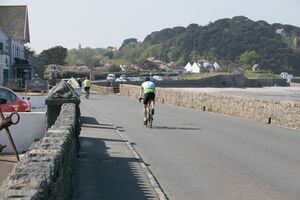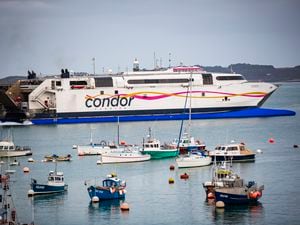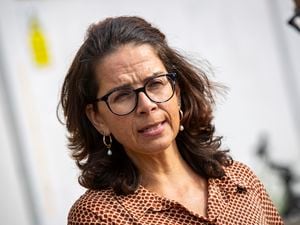A better world?
MY LAST column, which can be precised as ‘lock up the old and vulnerable if it helps get everyone else out of lockdown’, caused offence to at least one of my readers and I expect this column will offend many more.

I want to start by declaring that Covid-19 is an awful thing, restricting our civil right of free movement is quite awful, the economic stress and misery being suffered by so many is heart-breaking and that no one in their right mind would ever have wished this plague upon us.
But it happened. And we find that among the downsides their are upsides. Most notably the beneficial impact the global lockdowns are having on the planet. All ‘Blue Planet environmentalists’ should now steady themselves for what comes next. First you recycled, then you gave up your plastic carrier bags and finally, the greatest sacrifice of all, you eschewed plastic straws. Even then I know you constantly asked what more you can do to appease the planet and its great prophet, Attenborough.
Well, funnily enough, your prayers were answered. Most of you have now reduced car usage to almost zero. You run, walk or cycle regularly each day and are heard to remark how much easier that is now the roads are car-free and the air devoid of petrol and diesel fumes. The skies are empty as the fossil fuel-guzzling monsters have mostly been grounded and the sea is clear as gin as recreational boats are confined to harbours.
Or at least they were until lockdown was relaxed.
Just for a moment we had the Greta Thunberg dream of a better world and it only took us a day to implement it. And just about everyone complied, as communities will when the chips are down. But it will only take a day to go back to the planet-killing ways of February and yet we are all wishing for that to happen.
We wouldn’t stop recycling, would we? Or would we go back to using billions of disposable plastic carrier bags? What about plastic straws – will they be allowed back without a fight? No. And yet those good deeds in comparison to the sacrifice we have made over the last six weeks are but a drop in the polluted ocean.
The wonderful Extinction Rebellion people no longer have to travel to universities and dig up carbon sinks (lovely lawns) to force us to heed their prognosis of doom if we don’t change our ways because we, and they, have changed our ways. Our schoolchildren who marched for climate change can look around now, or at least they could have done last week, and seen the world they were marching to restore.
We had it in our hands, we had what so many had fought and campaigned for and did we embrace it? No we didn’t. Why not? Quite simply because it is too difficult and perhaps we don’t really want to hand over a nicer planet to our grandchildren after all. Although we can live without straws, we cannot live without the convenience and satisfaction of a 21st century lifestyle. Damn the planet – who needs polar bears anyway?
Isn’t it odd that the 21st century provides us with the answer to many environmental issues and yet we just don’t want to embrace them, even when we have had six weeks of proof that they work really well.
If white collar workers can work from home, then over a quarter of our workforce don’t have to commute to work. At a stroke, thousands of cars are removed from our roads at what was once the busiest and most congested time. Possibly two-car families could become one-car families? Zoom and Microsoft Teams could be the answer to our traffic problems and not paid parking after all.
Then what could we do with all the palaces of commerce which home working would make redundant? Perhaps we could repurpose them as units of accommodation and, blow me down, that would mean we wouldn’t have to build on lots of green field sites and further urbanise our beautiful island.
Plus we would concentrate more people within walking distance of Town. Just imagine the lovely sea views from your apartment in Admiral Park, and perhaps not just white collar workers could forgo the need for a car but so could retail and hospitality staff who would be only a short walk, bus or cycle ride from their work.
Now we get to the elephant in the room: tourism. Tourism will mean that our lovely clear and quiet skies will once again be filled with fumes and noise. There are two solutions, neither very palatable. One is to reserve the boats for passengers and use aircraft only for freight and medical emergencies (of course all those droning little pleasure aircraft would need to be grounded permanently). The second is to find a more climate-friendly replacement industry.
Of course there could be a change of heart of the locally environmentally conscious with their bags for life who choose to forgo non-essential off-island travel and holiday at home. This would be both economically useful by keeping money made here on-island and not frittered away in foreign climes after a multi-hour fossil fuel-guzzling guilt-laden long-haul flight as well as helping Deputy Brehaut to save our planet.
I’m pretty sure by now I’ve offended most of the population one way or another and as they reach for their fountain pens, I hope they have plenty of green ink and a thesaurus to help them with their prolixity.
But in all seriousness, we have seen what we could do and how quickly we could do it if we had a mind to. This is our Liberation weekend and the Liberation is the key event in our long history. Things did not go back to normal after 9 May 1945, far from it. Guernsey post-war was very different to Guernsey pre-war, and not always for the better, but the value of freedom was recognised by all who went through the Occupation. Freedom wasn’t valued pre war but it certainly was post war.
Guernsey will mostly go back to normal post Covid-19, our Second Liberation, but is there not a little something we have learned is worth investigating? A slower pace of life where there is time to stop and smell the flowers. Greater community spirit and more time for nuclear families to spend together. Leaders we can admire and follow with trust.
Deputy McSwiggan doesn’t like the war analogy, but Covid-19 is an enemy we will defeat, but not without grief, pain and suffering. Wouldn’t it be terrible, after all we have gone through, if we couldn’t keep hold of something good that we have learnt from this crisis? We may not have valued our environment as much as we thought before lockdown, but surely we do now?





